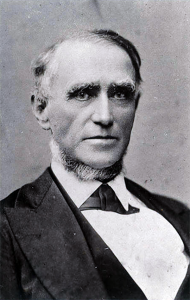Teacher and Pupil: Henry Tutwiler and William Russell Smith, 1869
- May 26th, 2020
- by specialcollections
- in General
In November 1869, Henry Tutwiler sat down to review (for the Mobile Register) a translation of the fifth book of the Iliad. A slender volume titled Diomede: From the Iliad of Homer,[1] it was the work of his former pupil William Russell Smith, who had studied under Tutwiler at the University of Alabama more than thirty years earlier. The two men had been friends ever since. Indeed, Tutwiler figured largely in Smith’s recollections of Tuscaloosa days, as a “delicate stripling of a youth,” a recent graduate of the University of Virginia who was so learned that he was “a whole faculty within himself.” Evidently Tutwiler’s manner as a professor was so appealing that “every boy fell absolutely in love with him” and felt for him “real affection, which suffered no diminution by the lapse of time.”[2]

While Tutwiler carried out several duties during his years (1831-1837) at the University, he was primarily a Classics professor. Smith has left us a memorable snapshot of his teacher: “As one of his peculiarities, Professor Tutwiler was seldom seen in or out of the school-room without having a small volume in his left hand. He had a diamond edition[3] of the ancient classics, and carried about with him either Virgil, Horace, the Anabasis, Iliad, Cicero, Terence, or Euripides. These were his quiet companions, from whom he seemed to be inseparable.” Smith went on to say that Tutwiler “was never without a pencil; and would stop in his walks, under the shade of an oak, and enrich the margin of his book with some useful hint or scholarly annotation.”[4]
In the decades since their shared time in Tuscaloosa, each man had enjoyed a distinguished career: Tutwiler as the founder of the Greene Springs School, the state’s most celebrated private academy; and Smith as a lawyer, U.S. Congressman, and author of legal treatises, works of fiction, plays, and poetry.[5] In his review of Diomede, Tutwiler recognized Smith’s status as an important public figure by including him in a list of European statesmen and crowned heads who were devoted to the Greek and Roman classics. Tutwiler was happy, he added, “to welcome any effort to throw off the reproach under which we, of the South especially, have labored, of a neglect of classical literature.”[6]
Tutwiler was aware that Smith had been laboring over the Iliad for some twenty years. Yet seeing a portion of that work “gotten up in the best style of Appleton’s” awoke in him memories even older.

“We well remember,” Tutwiler wrote, “how, when a lad at the University of Alabama,” Smith “was in the habit of handing in as exercises, poetical translations of the Latin poets.” Conjuring up (for modern readers) images of class files carefully stored away at Greene Springs, he declared that “we could, even now, lay our hands upon some of these juvenile productions.” Tutwiler understood that Smith’s translation was a true labor of love, and he quoted a passage from Diomede in which Smith declared that his pleasure in the work “has been long continued, making many a night glorious.”[7]
The Iliad is Homer’s telling of episodes from the Trojan War—beginning with an ugly quarrel in which Agamemnon, leader of the Greek expedition, offends the supreme Greek warrior Achilles. Their temper tantrums bode ill for Greeks and Trojans alike. Book five presents the exploits of the Greek hero Diomedes, who, inspired by the pro-Greek goddess Pallas (Minerva), rages like a berserker among the forces of Ilium (Troy), killing several notable warriors. In the process we meet many of Homer’s cast of mortals and immortals and see much of the home life of the latter. Such is Diomedes’ divinely granted power that in the course of his rampage he wounds Venus, goddess of love, and Mars, the god of war. Book five ends with Mars safely back in Olympus, his wounds healed.
